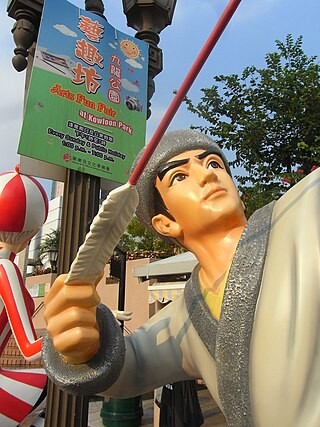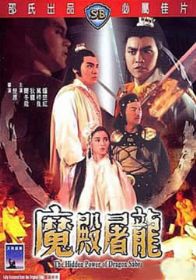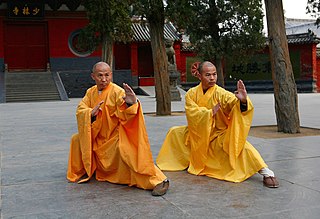Related Research Articles

Zhang Sanfeng refers to a legendary Chinese Taoist who many believe invented T'ai chi ch'üan. However,other sources point to early versions of Tai Chi predating Sanfeng. He was purported to have achieved immortality.

The Wudang Mountains consist of a mountain range in the northwestern part of Hubei,China,just south of Shiyan. They are home to a famous complex of Taoist temples and monasteries associated with the Lord of the North,Xuantian Shangdi. The Wudang Mountains are renowned for the practice of Tai chi and Taoism as the Taoist counterpart to the Shaolin Monastery,which is affiliated with Chinese Chán Buddhism. The Wudang Mountains are one of the "Four Sacred Mountains of Taoism" in China,an important destination for Taoist pilgrimages. The monasteries such as the Wudang Garden were made a UNESCO World Heritage Site in 1994 because of their religious significance and architectural achievement.

Guo Jing is the fictional protagonist of the wuxia novel The Legend of the Condor Heroes by Jin Yong. He also appears as a supporting character in the sequel,The Return of the Condor Heroes,and is mentioned by name in The Heaven Sword and Dragon Saber. He is a descendant of Guo Sheng,one of the 108 outlaws from Mount Liang in the classical novel Water Margin. Guo Jing and Yang Kang were both named by Qiu Chuji,who urges them to remember the Jingkang Incident and be loyal towards their native land,the Song Empire. Guo Jing is killed during the Battle of Xiangyang along with the rest of his family except his younger daughter,Guo Xiang.
Huang Rong is a fictional female protagonist in the wuxia novel The Legend of the Condor Heroes by Jin Yong. She also appears as a supporting character in the sequel,The Return of the Condor Heroes.
Zhang Wuji is the fictional protagonist of the wuxia novel The Heaven Sword and Dragon Saber by Jin Yong.

The Heaven Sword and Dragon Saber,also translated as The Sword and the Knife,is a wuxia novel by Jin Yong and the third part of the Condor Trilogy,preceded by The Legend of the Condor Heroes and The Return of the Condor Heroes. It was first serialised from 6 July 1961 to 2 September 1963 in the Hong Kong newspaper Ming Pao.
The Jiuyin Zhenjing,also known as the Nine Yin Manual,is a fictional martial arts manual in Jin Yong's Condor Trilogy.
The Ming Cult is a fictional cult and martial arts school featured in the wuxia novel The Heaven Sword and Dragon Saber by Jin Yong,first published in serial form from 1961 to 1963. It is also briefly mentioned in The Legend of the Condor Heroes,another novel also by Jin Yong. It is loosely based on Manichaeism,an actual gnostic religion which originated in Persia in the 3rd century CE and later spread to other parts of the world,including China. The cult's headquarters is at Bright Peak in the Kunlun Mountains and it has several other bases spread throughout China. Its most powerful skills are the "Heaven and Earth Great Shift" and the "Martial Arts of the Holy Flame Tablets".
Zhou Zhiruo is one of the two female lead characters in the wuxia novel The Heaven Sword and Dragon Saber by Jin Yong. Jin Yong describes Zhou Zhiruo's physical appearance as "beautiful,pure and free of worldly traits".
The Wudang School,sometimes also referred to as the Wu-Tang Clan,is a fictional martial arts school mentioned in several works of wuxia fiction. It is commonly featured as one of the leading orthodox schools in the wulin. It is named after the place it is based,the Wudang Mountains.
The Emei Menpai (门派) is a fictional martial arts school mentioned in several works of wuxia fiction. It is commonly featured as one of the leading orthodox schools in the jianghu. It is named after the place where it is based,Mount Emei.
The Kongtong School is a martial arts school mentioned in several works of wuxia fiction. It is commonly featured as a leading orthodox school in the jianghu. It is named after the place where it is based,the Kongtong Mountains.

Tang Hao or Tang Fan Sheng (1887–1959) was a Chinese lawyer and expert on chinese martial arts.

The Heaven Sword and Dragon Saber is a Chinese television series adapted from Louis Cha's novel of the same title. It is a final instalment of a television trilogy produced by Zhang Jizhong,preceded by The Legend of the Condor Heroes (2003) and The Return of the Condor Heroes (2006). Unlike the previous adaptations,this remake is the first to be primarily based on the third edition of the novel. The series was first broadcast on Wenzhou TV in China in October 2009.

Kung Fu Cult Master is a 1993 Hong Kong wuxia film adapted from Louis Cha's novel The Heaven Sword and Dragon Saber. Directed by Wong Jing,it featured fight choreography by Sammo Hung,and starred Jet Li,Sharla Cheung,Chingmy Yau and Gigi Lai in the lead roles.

The Hidden Power of the Dragon Sabre is a 1984 Hong Kong wuxia film directed by Chor Yuen and produced by the Shaw Brothers Studio. The film is a spinoff of Louis Cha's novel The Heaven Sword and Dragon Saber.

Wudang quan is a class of Chinese martial arts. In contemporary China,Chinese martial arts styles are generally classified into two major groups:Wudang (Wutang),named after the Wudang Mountains;and Shaolin,named after the Shaolin Monastery. Whereas Shaolin includes many martial art styles,Wudangquan includes only a few arts that use the focused mind to control the body. This typically encompasses taijiquan,xingyiquan and baguazhang,but must also include Baji chuan and Wudang Sword. Although the name Wudang simply distinguishes the skills,theories and applications of the internal arts from those of the Shaolin styles,it misleadingly suggests these arts originated at the Wudang Mountains. The name Wudang comes from a popular Chinese legend that incorrectly purports the genesis of taijiquan and Wudang Sword by an immortal,Taoist hermit named Zhang Sanfeng who lived in the monasteries of Wudang Mountain.

Heavenly Sword and Dragon Slaying Sabre is a 2019 Chinese wuxia television series adapted from the novel The Heaven Sword and Dragon Saber by Jin Yong. Originally published in newspapers from 1961 to 1963,the story has been revised twice;once in 1979 and the second in 2005. This remake is primarily based on the third edition of the novel. The series is the first adaptation to be released as a web series and was first broadcast on Tencent in China on February 27,2019.
References
- ↑ Condor Trilogy: Jiu Yang Zhen Jing
- ↑ 9yin9yang
- ↑ The Jin Yong Phenomenon: Chinese Martial Arts Fiction and Modern Chinese ... – Google Books
- ↑ ScholarBank@NUS: Terms of Use
- ↑ Wuxiapedia
- ↑ 36 Great Lessons From Jade Dragon Series
- ↑ Heaven Sword And Dragon Sabre – Television Tropes & Idioms
- ↑ Heavenly Sword and Dragon Saber – Episode 12 | Ancient Chinese Series, Heaven Sword & Dragon Saber, Recaps
- ↑ Heavenly Sword and Dragon Saber 2009 ep 1 (2/4) – YouTube